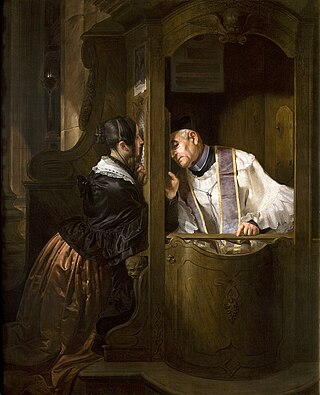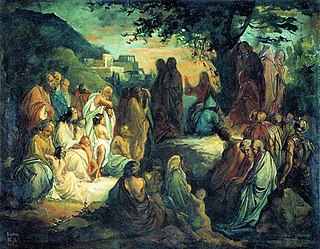Related Research Articles

The Epistle to the Romans is the sixth book in the New Testament, and the longest of the thirteen Pauline epistles. Biblical scholars agree that it was composed by Paul the Apostle to explain that salvation is offered through the gospel of Jesus Christ.
Justificatio sola fide, meaning justification by faith alone, is a soteriological doctrine in Christian theology commonly held to distinguish the Lutheran and Reformed traditions of Protestantism, among others, from the Catholic, Eastern Orthodox, Oriental Orthodox, Assyrian and Anabaptist churches. The doctrine asserts that it is on the basis of faith alone that believers are made right of sin ; and not on the basis of what Paul the Apostle calls "works of the law", which sola fide proponents interpret as including not only moral, legal or ceremonial requirements but any good works or "works of charity."

Thomas Fuller was an English churchman and historian. He is now remembered for his writings, particularly his Worthies of England, published in 1662, after his death. He was a prolific author, and one of the first English writers able to live by his pen.

Penance is any act or a set of actions done out of repentance for sins committed, as well as an alternate name for the Catholic, Lutheran, Eastern Orthodox, and Oriental Orthodox sacrament of Reconciliation or Confession. It also plays a part in confession among Anglicans and Methodists, in which it is a rite, as well as among other Protestants.

Fire and brimstone is an idiomatic expression referring to God's wrath found in both the Old and New Testaments. In the Bible, it often appears in reference to the fate of the unfaithful. Brimstone, an archaic term synonymous with sulfur, evokes the acrid odor of sulfur dioxide given off by lightning strikes. The association of sulfur with divine retribution is common in the Bible.
Hyper-Calvinism is a branch of Protestant theology that places strong emphasis on supralapsarianism, or salvation from eternity, where the atonement of Christ was and is difficult for the non-elect to understand, where man has little to do with his salvation, there being nothing man can do to resist being saved, wherein evangelism was given lower emphasis as compared to traditional Calvinism, and where assurance of salvation was felt within a person, identified by introspection.
In Christian hamartiology, eternal sin, the unforgivable sin, unpardonable sin, or ultimate sin is the sin which will not be forgiven by God. One eternal or unforgivable sin, also known as the sin unto death, is specified in several passages of the Synoptic Gospels, including Mark 3:28–29, Matthew 12:31–32, and Luke 12:10, as well as other New Testament passages including Hebrews 6:4–6, Hebrews 10:26–31, and 1 John 5:16.

Absolution is a theological term for the forgiveness imparted by ordained Christian priests and experienced by Christian penitents. It is a universal feature of the historic churches of Christendom, although the theology and the practice of absolution vary between Christian denominations.

Matthew 3:11 is the eleventh verse of the third chapter of the Gospel of Matthew in the New Testament. The verse occurs in the section relating the preachings of John the Baptist. In this verse he predicts that he will be followed by someone much greater than himself. The main theme of this verse is that John will soon be supplanted by a much greater figure and that John's water baptism is just a preparation for the much greater baptism with the Holy Spirit and fire.

The parable of the barren fig tree is a parable of Jesus which appears in Luke 13:6–9. It is about a fig tree which does not produce fruit.

Matthew 7:23 is the twenty-third verse of the seventh chapter of the Gospel of Matthew in the New Testament and is part of the Sermon on the Mount. This verse continues Jesus' warning against false prophets.
Matthew 9:13 is a verse in the ninth chapter of the Gospel of Matthew in the New Testament.
Matthew 11:17 is the seventeenth verse in the eleventh chapter of the Gospel of Matthew in the New Testament.
Good Friday Prayer can refer to any of the prayers prayed by Christians on Good Friday, the Friday before Easter, or to all such prayers collectively.
Nicholas Bernard was an Anglican priest and author during the 17th century. A dean in Ireland at the time of the Rebellion of 1641, he wrote descriptions of current events. He was also the biographer of James Ussher.

The Calling of Matthew is an episode in the life of Jesus which appears in all three synoptic gospels, Matthew 9:9–13, Mark 2:13–17 and Luke 5:27–28, and relates the initial encounter between Jesus and Matthew, the tax collector who became a disciple.

Thomas Allen or Allyn was an East Anglian nonconformist minister and divine who preached during the 1640s in Charlestown, Massachusetts, but returned to England during the Commonwealth and was ejected after the Restoration. He was the author of various published works.
Thomas Tuke (c.1580–1657) was an English clergyman and controversial writer, of royalist views in later life.

The Bastion of Truth Reformed Churches in the Philippines is a denomination of Christian churches all located in Southern Luzon, the Philippines.
Abraham Wright was an English theological writer and deacon.
References
- ↑ Grosart, Alexander Balloch, ed. (1871). Miscellanies of the Fuller Worthies' Library. Vol. II. p. 21. Retrieved 7 December 2011.
. Dictionary of National Biography . London: Smith, Elder & Co. 1885–1900.